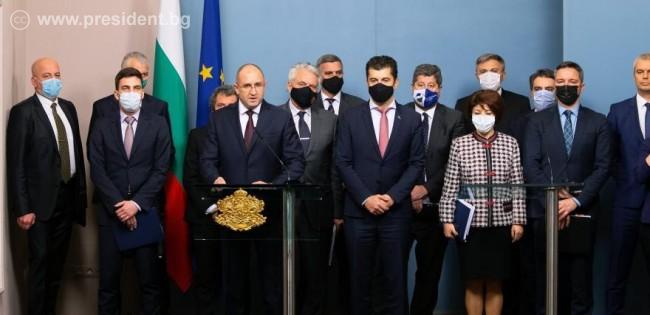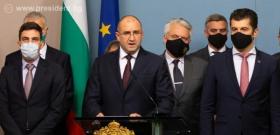 10 January 2022 | 20:38
10 January 2022 | 20:38
President after CCNS: The opening of EU accession negotiations with the Republic of North Macedonia should not be tied to deadlines, but to achieving tangible results
The Head of State's statement after the meeting of the Consultative Council for National Security (CCNS) on 'Integration of the Western Balkans into the EU. Bulgaria's role in EU enlargement and the Stabilisation and Association Process: the Republic of North Macedonia and Albania'.
Media representatives,
Ladies and Gentlemen,
I would like to present to you the CCNS opinion and proposals on the 'EU Integration of the Western Balkans. Bulgaria's role in the EU enlargement and in the Stabilisation and Association Process: the Republic of North Macedonia and Albania'.
The CCNS discussed the prospects for the integration of the Western Balkans into the European Union, which is a strategic interest of Bulgaria, coinciding with the interests of our partners and allies of the European Union and NATO.
Particular attention was paid to the integration process of the Republic of North Macedonia, which is at a standstill. It was noted that for four years after the signing of the 2017 agreement, that applicant country has not done what is necessary for its implementation, nor has it given guarantees for the implementation of the commitments undertaken. As a result of the consultative meeting held in September 2019 at the Presidency, with the attendance of representatives from the executive and the legislature, a 'Framework position on the enlargement of the European Union and the Stabilisation and Association Process: the Republic of North Macedonia and the Republic of Albania' was adopted by the Council of Ministers, supported by a declaration of the 44th National Assembly. These documents are the basis for the policy regarding the enlargement of the European Union to the Republic of North Macedonia and the Republic of Albania and have led to Bulgaria's consistently voiced refusal to approve the start of accession talks with the Republic of North Macedonia.
Thirty years ago this week, on 15 January 1992, Bulgaria was the first in the world to recognise today's Republic of North Macedonia as a newly independent state. Bulgaria has never denied, and does not deny, the right of the citizens of the Republic of North Macedonia to self-determination based on their own identity and to use their own languages, according to the constitution of their country. At the same time, Bulgaria insists on the full equality of the Macedonian Bulgarians with the other parts of the peoples in the Republic of North Macedonia, explicitly spelled out in their constitution. The decades-long policy of discrimination against the Macedonian Bulgarians, 120 000 of whom are also Bulgarian citizens - and thus EU citizens - has recently escalated into open public attacks against citizens who have declared their Bulgarian origin.
The rights of Macedonian Bulgarians are a key element of the Copenhagen criteria for EU membership, they cannot be the subject of negotiations and their protection is explicitly stated in the 2019 National Assembly Declaration.
The participants in the Consultative Council agreed that comprehensive, targeted and resourceful action is needed to restore trust and intensify bilateral cooperation in all areas of mutual interest. Of particular importance are projects providing transport, infrastructure, digital and energy connectivity, with a focus on Corridor 8. This, in turn, will contribute to overcoming the stagnation in relations between the two countries, give impetus to accelerating the negotiation process and to the sustainable development and prosperity of the region.
The members of the Consultative Council also noted the achievements of the negotiation process so far. In some areas of bilateral relations, there is an emerging opportunity for agreement. The resolution of outstanding political issues will significantly accelerate progress in all other areas.
The participants in the CCNS reiterated Bulgaria's position on the preparedness of the Republic of Albania to start the negotiation process for EU membership.
On the basis of the discussions, the CCNS adopted the following proposals to the executive and the legislature:
1. In conducting the country's foreign policy, the Council of Ministers should implement Bulgaria's national position, respecting the requirements arising from the 2017 Treaty, the 2019 Framework Position and the Declaration of the 44th National Assembly.
2. Giving consent for the start of EU accession talks with the Republic of North Macedonia should not be conditional on deadlines, but on achieving real results, including, I would like to stress, with regard to the rights of the Macedonian Bulgarians.
3. The Executive should continue to work on the implementation of the 2017 Treaty in the negotiation process for EU membership of the Republic of North Macedonia.
4. The Executive should prepare and secure in terms of staff and financial resources an action plan with measures to achieve tangible progress in all areas of bilateral relations with the Republic of North Macedonia.
5. The Executive should propose to the partners in the Republic of North Macedonia the establishment of joint working groups on areas in accordance with the Treaty of Friendship, Neighbourhood and Cooperation, with a view to intensifying bilateral ties.
6. The Executive should take measures to accelerate the construction of Corridor No. 8, jointly with the Republic of North Macedonia and the Republic of Albania as a single project in its entirety - highway, railway, energy and digital connectivity.
7. The National Assembly should propose to the legislature of the Republic of North Macedonia the establishment of a structured dialogue between parliamentary committees and friendship groups to strengthen trust and support the overall process.
I would like to thank all the participants in the Consultative Council for their active work today and for the consensus reached, because in what lies ahead as the continuation of the negotiation process, it is of utmost importance that Bulgarian statesmen and politicians have unity in their views and actions.
Thank you for your attention!
 Head of State Awarded the Order of Madara Horseman, First Class, to Ambassador of the Republic of Iraq
Head of State Awarded the Order of Madara Horseman, First Class, to Ambassador of the Republic of Iraq
 President Radev: Improving Connectivity Is Key to Strengthening Security and Stability in the Black Sea Region
President Radev: Improving Connectivity Is Key to Strengthening Security and Stability in the Black Sea Region
 Radev Discussed Europe's Prospects for Addressing the Challenges It Faces with Hungarian Foreign Minister
Radev Discussed Europe's Prospects for Addressing the Challenges It Faces with Hungarian Foreign Minister
 President Rumen Radev Imposes a Veto on the Amendments to the Act on the Administrative Regulation of Economic Activities Related to Oil and Petroleum Products
President Rumen Radev Imposes a Veto on the Amendments to the Act on the Administrative Regulation of Economic Activities Related to Oil and Petroleum Products
 President: Bulgaria and Lebanon Share a Common Aspiration to Activate the Dialogue between Institutions and Business Representatives
President: Bulgaria and Lebanon Share a Common Aspiration to Activate the Dialogue between Institutions and Business Representatives
 Rumen Radev: The Release of the Bulgarian Medics in Libya Was a Test Not Only for Bulgaria, but also for the Moral Strength of the International Community
Rumen Radev: The Release of the Bulgarian Medics in Libya Was a Test Not Only for Bulgaria, but also for the Moral Strength of the International Community
 President Rumen Radev Honoured the Ambassador of Japan with the Order of the Madara Horseman, First Class
President Rumen Radev Honoured the Ambassador of Japan with the Order of the Madara Horseman, First Class






 2025
2025